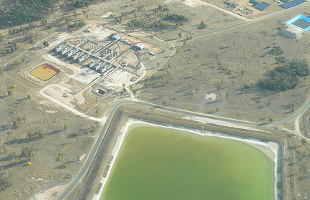 Aerial view of a CSG fracking siteFLICKR, LOCKTHEGATEFracking, the increasingly popular strategy of breaking up underground shale formations using pressurized solutions piped far under the earth to extract oil and gas, may lead to the environmental release of endocrine-disrupting chemicals (EDCs) that have previously been associated with birth defects, infertility, and cancer, according to a study published yesterday (December 16) in Endocrinology. Water sampled from hydraulic fracking sites in Colorado revealed the presence of such chemicals at higher levels than control sites, as did samples collected from the Colorado River, where wastewater from fracking operations could end up following accidental spills.
Aerial view of a CSG fracking siteFLICKR, LOCKTHEGATEFracking, the increasingly popular strategy of breaking up underground shale formations using pressurized solutions piped far under the earth to extract oil and gas, may lead to the environmental release of endocrine-disrupting chemicals (EDCs) that have previously been associated with birth defects, infertility, and cancer, according to a study published yesterday (December 16) in Endocrinology. Water sampled from hydraulic fracking sites in Colorado revealed the presence of such chemicals at higher levels than control sites, as did samples collected from the Colorado River, where wastewater from fracking operations could end up following accidental spills.
“With fracking on the rise, populations may face greater health risks from increased endocrine-disrupting chemical exposure,” senior author Susan Nagel from the University of Missouri School of Medicine told the Los Angeles Times.
Working in Garfield County, Colorado, an operational hub of fracking-based oil and gas development, Nagel and her colleagues collected samples of surface water and groundwater from five natural gas sites that had experienced a wastewater spill in the last six years. In each sample, the researchers measured levels of four classes of EDCs, and found that 89 percent of the samples showed estrogenic properties, while 41 percent were anti-estrogenic. Moreover, 12 percent of the water samples were androgenic, while 46 percent were anti-androgenic. These EDC activity levels, as well as those observed ...























